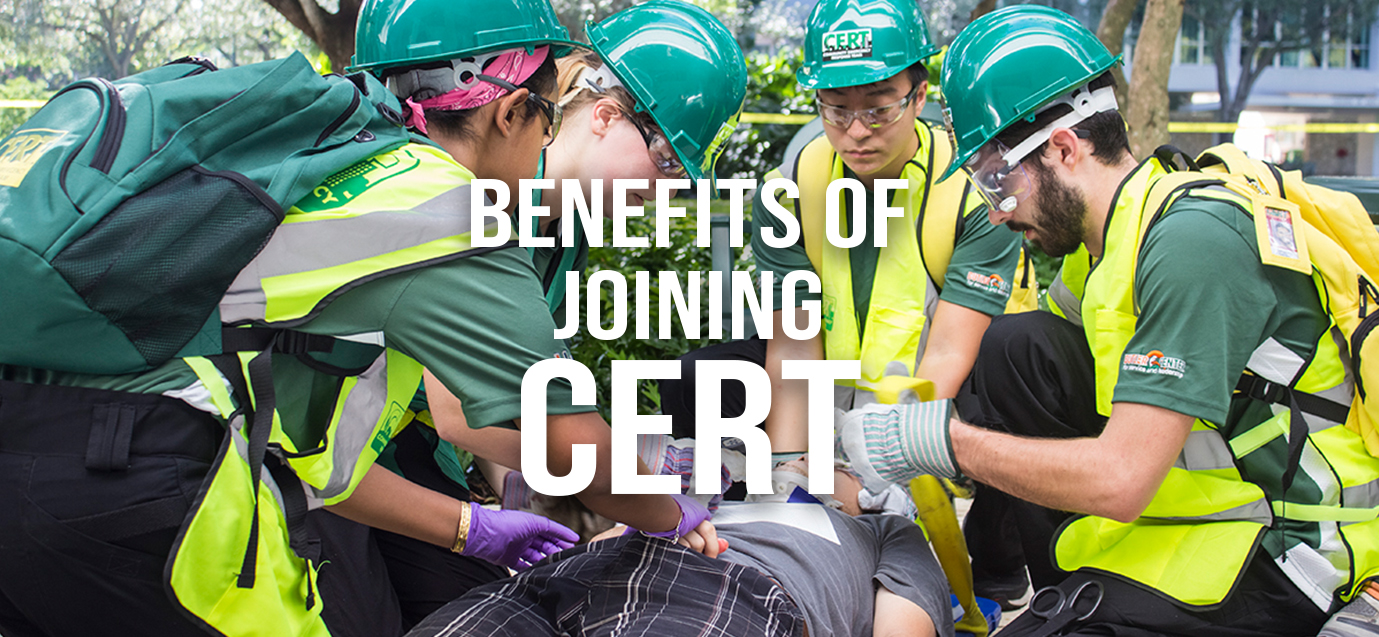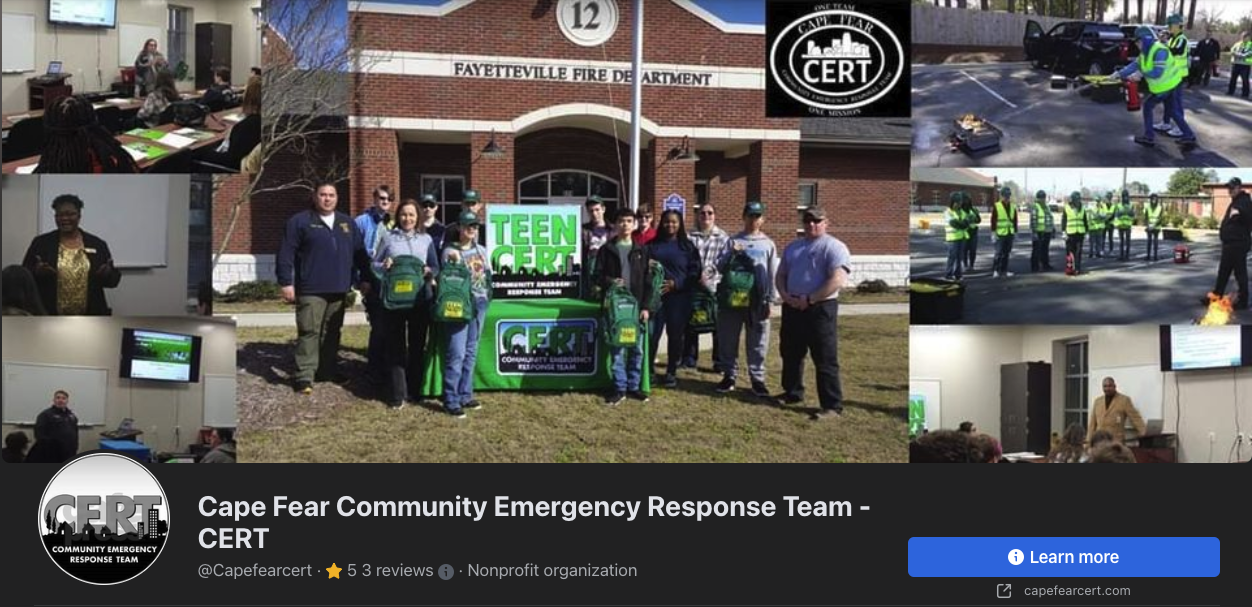
Benefits of Becoming a CERT Member
Tuesday September 13, 2022
Community Emergency Response Teams (CERT) are made up of volunteers trained by professionals who respond to local emergencies. CERT members are trained in emergency preparedness, team organization, medical operations, fire safety and prevention, light search and rescue, and terrorism/active shooter response. Over 600,000 people have taken CERT training in the USA.
These members dedicate lots of time and energy to volunteering in their communities. We asked CERT members across the country a couple questions about the benefits of joining CERT, here are their answers:
Melode
Cape Fear CERT
“I learned about CERT when we lived in Charleston SC and I knew it was something I wanted to do. When we moved back to NC my husband and I found a CERT team and joined it. After a year we started our own team in Cumberland County NC and it’s called Cape Fear CERT. I love helping people and helping in our community. CERT offers training in so many useful skills, but I would have to say that the medical skills that are learned are the best. I think everyone should have CERT training. We personally keep 24 cases of water at all times. We have go-bags ready at all times and we keep tarps in case of roof damage.”

Michael
Christian County CERT
How did you first learn about CERT?
“I heard about CERT from some of the other disaster relief groups I volunteer with. I’ve always enjoyed learning new ways to work with others during a disaster."
What's your favorite thing about being a CERT Member?
"I love being able to help others. Being a CERT member allows me to do that, be it at a first aid tent at a local event or after a disaster."
What skills did you learn from CERT that you think every person should have?
"I’m a nurse by profession so I knew the first aid part already but I can’t stress how important it is to know even just the basics. Living with a preparedness mindset can be so beneficial. You never know when you’ll be called out with CERT but you also never know when a disaster will occur. Training and volunteering with CERT keeps that “what if?" preparedness mindset at the front of your mind."
How do you prepare for a disaster in your personal life?
"I keep a go bag ready and have a decent first aid kit. I’ve found that being prepared for power outages and stocking up on a week or two supply of food and water can really lower your stress when the world around you turns upside down.”
Michael also runs the blog Red Sky Ready, a great source for staying up-to-date on disaster preparedness and response news.
Justin
Walton County CERT
How did you first learn about CERT?
"My County EM started a CERT program in 2017. I took the CERT Basic training in April 2017, and then became the volunteer coordinator in May 2017. We then grew the volunteers from me, myself and I to we now have 150 on the roster!"
What's your favorite thing about being a CERT Member?
"Honestly, my favorite thing about being a CERT Member is the rewarding feeling when you know you helping folks within your community."
What skills did you learn from CERT that you think every person should have?
"How to be “self sufficient”, specifically during a disaster, but truly day to day."
How do you prepare for a disaster in your personal life?
"I have my family evacuate, then I am called to the EOC as our CERT program sits as the volunteer and donations lead during disasters."
Robert
Sacramento Fire CERT
How did you first learn about CERT?
"I first heard of CERT from a local CERT program that was helping at an Air Show. They had an information booth and provided a great overview of the program and its benefits."
What's your favorite thing about being a CERT Member?
"I'm lucky to be on a VERY active team, so we receive a lot of requests to support wildfire base camps, animal shelters for evacuees, and medical support requests. I love the "paying it forward" aspect of going out of area (sometimes hours away) and helping those in need. The feeling of community and helping - there is nothing like it."
What skills did you learn from CERT that you think every person should have?
"Disaster Preparedness... many people can think of a few things to do to prepare, but having a group of people with expertise to help you think outside the box was invaluable."
How do you prepare for a disaster in your personal life?
"I have routine contact with our HOA and Neighborhood Watch groups to provide updates on local threats (wildfire, infrastructure, etc), and as an emergency manager in my day job, I help keep my agency prepared for disasters and able to operate."
Archie
Broome County CERT
How did you first learn about CERT?
"In February 2013 I was at home recovering from knee surgery while taking a Managing Homeland Security course online through Excelsior College. As it was a criminal justice course - which was my minor – I thought that it was more law enforcement-oriented such as understanding the terrorist mind and how to deter and investigate acts of terror. I quickly learned that it was more of a general overview of how all first responders should work individually and together when responding to all types of disasters. Basically, it was an eight-week ICS 100 and 700 course – and there might have been a few other courses thrown in there, too. One assignment during the course was to explore the FEMA website for a better understanding of their role in hazard mitigation, response, and recovery. While browsing the site I stumbles upon their section on volunteer opportunities and learned about CERT. I had never heard of the program before, but I was interested in learning more. I was even more surprised that our county had an active CERT for two years by that time. So, the next year when I felt that my knee was strong enough, I signed up to take the basic training course. Fast forward eight years and I have now been the team chief for the past year."
What's your favorite thing about being a CERT Member?
"I served in the United States Army for four years and was honorably discharged in 1992. When I joined the local CERT, I soon realized that there was something missing from my life for the past twenty-two years: being part of a team with a sense of purpose. I finally understood why some veterans have a difficult time readjusting to civilian life: they miss the camaraderie and being ready to do what is necessary to deal with a problem. I was shocked when I discovered that I was one of them. Since joining CERT, I have been a proponent of veterans getting involved in their community. Whether they join their local CERT, fire department, or some other service organization, I encourage them to continue the mission by being willing and able to jump in and help when and where they are needed."
What skills did you learn from CERT that you think every person should have?
"I believe that everyone should at least know the skills that they would learn in the CERT basic training course. It is hard to select just a few skills that would be most important as no one knows exactly what they will face in a disaster. It could be extinguishing a fire, administering first aid, or helping free a trapped victim. But one thing is certain: when a disaster occurs, you do not want to be the one saying, “Maybe I should have _.” When your world is thrown into chaos you will probably be your own first responder and maybe the one your family, friends, and neighbors will be looking to for guidance. The question is: 'Are you ready?'"
How do you prepare for a disaster in your personal life?
"Since joining CERT, I have taken to carrying a go-bag with me at work. It is just a small sling bag that does not hold much, but it had a first aid kit, street map, a multi-tool, cellphone chargers, a handheld amateur radio, and space to carry a couple bottles of water so I have a few bare essentials in case an emergency occurs when I am out of the office."
Bob
West Hartford CERT
"I am the Team Leader of West Hartford (CT) CERT where we serve under the town's Office of Emergency Mgt. Our team is pretty young - only about 1.5 years - but have over 130 trained volunteers, with another cohort being trained next month. And we are VERY busy; our Emergency Mgt (PD, FD, DPW, etc) and community leaders have really embraced us and what we do! Now, as for your questions: 1. As an EMT, a US Coast Guard vet, a former member of the Red Cross Disaster Action Team and various corporate Medical Response Teams, I've always actively sought out ways to help people in crisis. So when I heard about WH CERT forming, I knew I had to get involved! (I think I'm Member #4.) 2. Although we train for the "ER" of CERT, I think the "C" and "T" are the parts I enjoy the most. This is a great Team to lead with many different skills, backgrounds, experiences, and interests. But the thing I enjoy the most is how the Team responds to requests for our assistance in a wide variety of community activities -- with expedience, enthusiasm, and a "Can Do" attitude that I find inspiring. 3. As an EMT, I particularly enjoy teaching the Disaster Medical Operations portions of the training program -- and have been so proud of how several of our teammates have responded appropriately when faced with a medical situation, due to the training they received in CERT. 4. In my car, I carry a Trauma Kit and my heavily augmented ProPac CERT backpack, as well as seasonal survival gear. At home, we have our Go bags ready to, well, go...and keep our shelves stocked with necessities should the weather (or other stuff) turn bad."
We’d like to thank all the CERT members that provided answers to our questions. Thank you for everything you do, hopefully this article will inspire more people to join their local CERT. If you're interested, use this page to search for teams in your area.
To those of you that are already in CERT, we offer a 5% discount on our online store on all CERT items. Use code: NCA5 to get 5% off your order today!